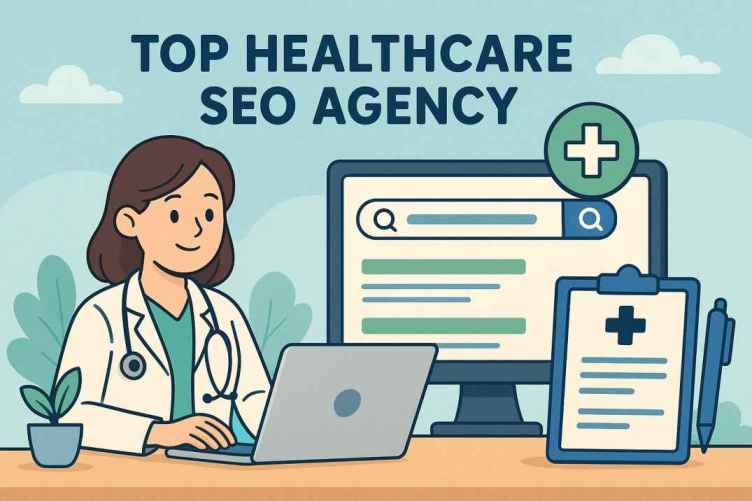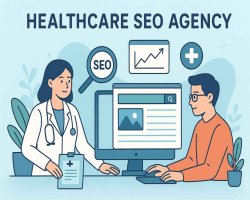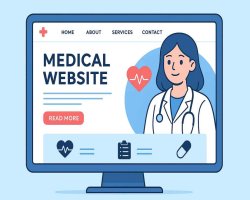Best Medical Website Design & Healthcare Website Development Services in 2025

Importance of Medical Website Design in 2025
In 2025, patients no longer rely solely on referrals or physical visits to choose healthcare providers. Instead, they search online to find medical website design services that reflect trust, professionalism, and modern functionality. A website has become the digital face of any healthcare business—whether it is a private clinic, dental practice, or large hospital.
With the rapid growth of telemedicine and digital consultations, healthcare providers must invest in healthcare website development that goes beyond basic online presence. Websites today are not just informational—they are conversion tools that guide patients through appointments, inquiries, and trust-building.
A well-crafted healthcare website ensures:
Improved patient trust through professional aesthetics.
Easy navigation for patients across devices.
Higher ranking in Google search results.
According to a 2025 Statista report, 84% of patients check a clinic’s website before booking an appointment. Consequently, ignoring modern medical website design means losing patients to competitors.
What Makes Healthcare Website Development Unique?
Healthcare website development is different from other industries because it must balance patient experience with regulatory compliance. Websites must be designed with care, ensuring accessibility, HIPAA compliance, and user-friendly navigation.
Key factors that make healthcare development unique:
Patient-Centric Layouts: Websites must prioritize patient needs—easy appointment booking, doctor profiles, and treatment details.
Secure Data Handling: Encryption and secure forms are vital for protecting patient information.
Multi-Device Support: With more patients using smartphones, responsive medical websites are essential.
Content Accuracy: Information must be precise and regularly updated to maintain trust.
Therefore, healthcare website development is not just about design—it is about creating a digital ecosystem that patients can trust.
Why Every Doctor Needs a Professional Website Design for Doctors
Doctors and small clinics often underestimate the value of a professional website design for doctors. However, in 2025, patients expect a seamless online experience when researching medical services.
Professional websites provide:
Enhanced Credibility: Patients trust doctors who invest in a professional website.
Easy Appointment Booking: Integrated scheduling tools improve efficiency.
Patient Education: Blogs and resources educate patients and improve SEO rankings.
Competitive Advantage: Stand out among other doctors in your area.
Consequently, without a professional website, doctors risk losing credibility and potential patients.
Features of a Responsive Medical Website
A responsive medical website adapts seamlessly across devices. Whether a patient browses on desktop, mobile, or tablet, the site must function smoothly.
Core features include:
Mobile Optimization: Ensures usability on all screen sizes.
Fast Loading Speed: Patients leave websites that load slowly.
Clear CTAs (Call to Actions): Appointment buttons, contact forms, and helplines.
Accessibility: WCAG compliance for differently-abled patients.
Google’s 2025 ranking factors prioritize mobile-first websites, making responsive design a necessity for healthcare providers.
The Rise of WordPress Healthcare Websites in 2025
WordPress remains the most popular CMS for healthcare websites because of its flexibility, scalability, and SEO capabilities.
Advantages of WordPress healthcare websites:
Cost-effective development.
Easy content management for doctors and staff.
Wide range of medical-specific themes and plugins.
Built-in SEO features for higher visibility.
Therefore, many hospitals and clinics are shifting to WordPress for robust, scalable, and SEO-friendly healthcare websites.
Custom Clinic Websites: Tailored Solutions for Modern Healthcare
Every clinic is different, and so are its patients. A custom clinic website offers personalization that generic templates cannot provide.
Benefits of custom solutions:
Unique design reflecting brand identity.
Patient-specific features such as portals and telemedicine tools.
Integration with electronic medical records (EMR).
Scalable to add new services in the future.
Custom websites ensure your clinic stands out while addressing patient needs effectively.
Dental Clinic Website Design: Engaging Patients Effectively
Dentists require websites that highlight trust, aesthetics, and patient-friendly navigation.
A good dental clinic website design includes:
Smile galleries showcasing before-and-after results.
Online appointment systems.
Insurance and payment integration.
Blogs on dental care tips for SEO traffic.
Consequently, dental clinics with well-structured websites attract more patients and build stronger credibility.
Aesthetic Clinic Websites: Blending Beauty with Functionality
Aesthetic clinics thrive on visual appeal. A website for cosmetic or dermatology clinics must balance elegance with patient trust.
Best practices for aesthetic clinic websites:
Use high-quality imagery and videos.
Showcase treatments, pricing, and results.
Integrate chatbots for instant inquiries.
Offer online consultation booking.
Therefore, patients feel more confident choosing an aesthetic clinic with a professional, visually engaging website.
Key Elements of a Successful Healthcare Website
For any healthcare site to succeed, it must combine design, functionality, and compliance.
Key elements:
Clear navigation menus.
Visible appointment booking buttons.
Patient reviews and testimonials.
Secure contact forms.
Optimized content for SEO.
SEO & Performance Optimization for Medical Websites
A medical website must be optimized for search engines to attract patients. Strategies include:
Keyword optimization for services.
Local SEO for clinics and hospitals.
Schema markup for healthcare.
Fast load times and image compression.
High-performance websites improve both patient trust and Google rankings.
Choosing the Right Agency for Healthcare Website Development
Selecting the right agency is crucial. Look for:
Proven experience in medical projects.
Strong portfolio in healthcare website development.
Knowledge of compliance and data security.
Transparent pricing and scalable services.
Partnering with experts ensures long-term success and digital growth.
FAQs (10 Unique Questions)
1. What makes medical website design different from regular website design?
Medical website design is more than just aesthetics—it focuses on patient trust, accessibility, and compliance. Unlike standard websites, healthcare platforms must integrate features such as appointment booking, patient forms, HIPAA-compliant security, and easy-to-understand medical content. The goal is not just to look professional but to instill confidence in patients while ensuring usability across all devices.
2. How much does healthcare website development cost in 2025?
The cost of healthcare website development varies depending on features and complexity. A basic informational website for a small clinic may start from $800–$1,500, while advanced platforms with telemedicine, patient portals, and EMR integration can cost $5,000–$15,000. Factors such as design customization, responsive layouts, and SEO integration also influence pricing. In India, agencies often offer more cost-effective solutions compared to the U.S. or Europe.
3. Why are responsive medical websites important for doctors?
In 2025, most patients use smartphones to search for doctors and clinics. A responsive medical website automatically adjusts to mobile, tablet, and desktop screens, ensuring seamless navigation. This prevents patient drop-offs and improves Google rankings, as search engines prioritize mobile-friendly websites. Consequently, doctors with responsive sites attract more patients and retain them through better user experiences.
4. Can small clinics afford custom clinic websites?
Yes, small clinics can absolutely afford a custom clinic website. While large hospitals may require complex features, smaller practices can invest in affordable custom solutions that reflect their brand identity, services, and patient care. Custom designs also grow with the clinic—meaning new features (telemedicine, online payments, blogs) can be added later without rebuilding the website entirely.
5. Are WordPress healthcare websites secure?
WordPress remains one of the most popular platforms for healthcare websites because it is cost-effective and easy to manage. With the right security plugins, SSL certificates, and HIPAA-compliant hosting, WordPress healthcare websites are very secure. Many top hospitals and clinics rely on WordPress for scalable, secure, and SEO-friendly healthcare website development in 2025.
6. How does dental clinic website design improve patient trust?
A dental clinic website design plays a critical role in patient confidence. Features such as before-and-after smile galleries, treatment pricing, testimonials, and blogs on dental hygiene help establish credibility. When patients see a well-structured website that highlights services clearly, they are more likely to book an appointment compared to clinics with outdated or no online presence.
7. Do aesthetic clinic websites require special features?
Yes, aesthetic clinic websites should focus heavily on visuals. Patients seeking cosmetic or dermatology services often look for detailed galleries, videos of procedures, pricing transparency, and instant booking features. Integrating live chat support, Instagram feeds, and customer reviews further enhances engagement, making patients feel confident in choosing the clinic.
8. How does SEO impact medical and healthcare websites?
SEO is a critical part of healthcare website development. Patients often search for terms like “best cardiologist near me” or “dental clinic in Delhi.” Without SEO, your website won’t appear in those searches. Optimizing content with the right keywords, building backlinks, and ensuring fast load times significantly improves visibility. Consequently, SEO brings consistent patient traffic without ongoing advertising costs.
9. What role does patient experience play in medical website design?
Patient experience is at the heart of medical website design. From intuitive navigation and appointment scheduling to quick access to services, a website must prioritize ease of use. Patients often leave websites that are confusing, slow, or cluttered. A smooth digital experience builds trust, improves satisfaction, and increases the chances of repeat visits.
10. How do I choose the right agency for healthcare website development?
When selecting an agency, prioritize those with proven expertise in medical website design. Look for portfolios of healthcare clients, knowledge of compliance requirements, and strong SEO strategies. Agencies such as SMPLY Studio and RAASIS TECHNOLOGY specialize in healthcare-specific solutions, offering both design and performance optimization tailored for doctors, clinics, and hospitals.
Future Trends in Medical Website Design and Development
The future of medical websites lies in AI integration, telemedicine tools, and patient-centric designs. As patients grow more tech-savvy, investing in professional medical website design and healthcare website development will determine a clinic’s or hospital’s success.
Whether you are a dentist, dermatologist, or general practitioner, the key to digital growth in 2025 is a well-designed, responsive, and optimized healthcare website.
👉 Partner with the best agencies today and give your clinic the competitive edge it deserves.
Powered by Froala Editor
You May Also Like

पासपोर्ट बनवाने की प्रक्रिया अब हुई और आसान, भारत सरकार ने बस्तीवासियों के लिए दी नई सौगात।

Top Mental Health SEO Services for Therapists & Professionals in 2025

Best Healthcare SEO Services in India: Rank Your Clinic or Hospital with Experts in 2025

How to Get More Views on Instagram Reels in 2025: 11 Proven Tips That Actually Work

Healthcare SEO Agency: The Ultimate 2025 Guide for Doctors and Medical Professionals to Boost Organic Traffic

